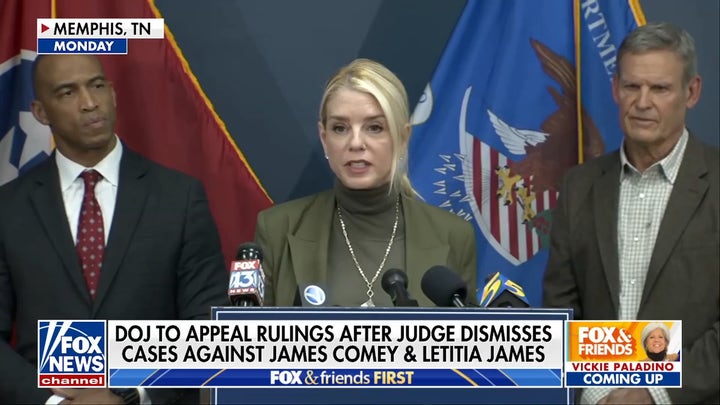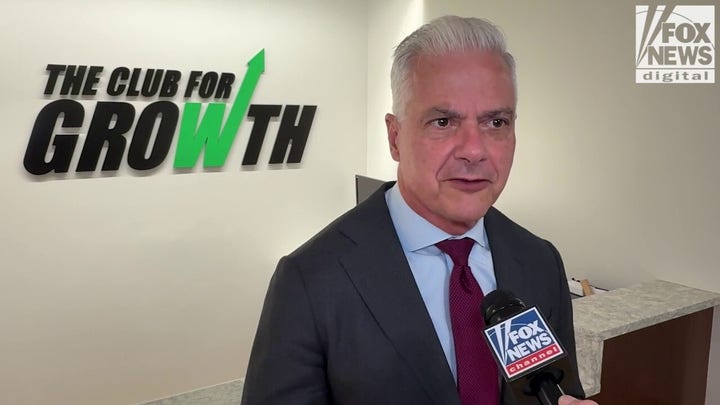The Club for Growth says it has President Donald Trump’s back as the president pushes Republican-controlled states to redraw congressional maps in order to create more right-leaning districts to help defend the GOP’s fragile House majority in next year’s midterm elections.
‘We’re all in on helping Republicans do redistricting,’ David McIntosh, longtime president of the deep-pocketed and influential conservative group, said in an exclusive interview with Fox News Digital.
McIntosh highlighted that the Club for Growth’s seven-figure efforts ‘give Republicans a better shot at winning those extra districts.’
The push by the Club is the latest example of its strong support for the president and his policies, just two years after the group worked to prevent Trump from winning the 2024 Republican presidential nomination amid a bitter feud.
Trump and his political team are aiming to pad the GOP’s razor-thin House majority to keep control of the chamber in next year’s midterms, when the party in power traditionally faces political headwinds and loses seats.
Trump is trying to prevent what happened during his first term in the White House when Democrats reclaimed the House majority in the 2018 midterm elections.
Texas was the first Republican-controlled state to pass rare but not-unheard-of mid-decade congressional redistricting, although a ruling by two federal judges threatens to overturn the redrawn map. Missouri, North Carolina and Ohio have also drawn new maps as part of the president’s push.
Indiana, where McIntosh served three terms as a congressman 25 years ago, is the latest battlefield in the high-stakes redistricting showdown pitting Trump and Republicans versus Democrats to shape the 2026 midterm landscape in the fight for the House majority.
‘Democrats for years have gerrymandered and Republicans have not, and now it’s time so we can have Republicans in Congress for states like my home state of Indiana, step up to the plate, draw the district, so Republicans can be represented,’ McIntosh argued.
Trump has threatened to back primary challenges against Republican state lawmakers in Indiana who are reluctant to pass redistricting.
‘I was delighted to see President Trump calling them to do it. And you know, he said, we’re going to start endorsing against you if you don’t do what’s right for the Republican Party and for the nation. Club for Growth will be there to back up his endorsements,’ McIntosh said.
And the Club’s political arm, the Club for Growth Action super PAC, which is one of the biggest spenders in Republican primary showdowns thanks to the support of top-dollar conservative donors, is running ads to support the president’s push in right-leaning states across the country.
‘We’re way over seven figures when you put together all the different states. And what we’re doing is running ads. We have a new ad today that talks about the need for redistricting,’ McIntosh revealed. ‘We have a program that brings constituent calls into the Senate members, and so they get to hear directly from their voters that they want them to do this.’
It’s not just redistricting.
The Club is spending seven figures in next week’s hotly contested special election for a Republican-controlled vacant House seat in a solidly red congressional district in Tennessee.
‘Matt Epps is going to win,’ McIntosh said as he pointed to the Trump-endorsed GOP nominee in the race to succeed former Republican Rep. Mark Green, who resigned from office in June to take a private sector job.
‘It’s going to be a hard race. They all are, but he’s going to win that race because he’s more in line with Tennessee,’ McIntosh said of Van Epps. ‘I’m confident of him, and we’re going to help him do it.’
And looking ahead to next year’s midterms, McIntosh shared that the Club has ‘already started raising a $40 million fund to keep the House majority, and we’re about 25 million into it.’
‘I’m going to keep going, and then we’ll deploy that to make sure Republicans can keep the majority,’ he emphasized.
And as they’ve done in the past, the Club, which pushes a fiscally conservative agenda, including a focus on tax cuts and other economic issues, will once again play an influential role in GOP primaries.
‘We’re interviewing a lot of candidates now. We’re going to look for the strongest conservative candidate, somebody who wants to continue the economic progress, less regulation, lower taxes, balance the budget, the things that will make America great,’ McIntosh said. ‘And then when we endorse them, we’ll come in with our funding to pay for ads. We’ll recruit and help them raise money. It’s important we get the right Republicans in these primaries, and there are a lot of open seats.’
Democrats are energized coming out of their party’s sweeping victories earlier this month in the 2026 elections.
‘Democrats have racked up wins this year by running on affordability and lowering costs, and headed into 2026 our momentum continues to build,’ CJ Warnke, communications director for the Democrat-aligned House Majority PAC told Fox News Digital.
Warnke predicted, ‘As Trump’s poll numbers on the economy continue to plummet and voters see him prioritizing the elite over lowering prices, his broken promises will sink House Republicans. No Republican-held seat is safe, and HMP will do whatever it takes to win the House in 2026.’
McIntosh sees the 2025 elections as ‘a warning sign, a wake-up call for two things.’
‘One, we got to get our voters out, and that’s the job of the party and Club for Growth and groups like us,’ McIntosh noted.
But he added that ‘the party has to explain how our agenda makes life more affordable, how we can lower your insurance costs by forcing the insurance industry to tell you how much they’re charging. We can lower housing by getting rid of all sorts of regulation.’
McIntosh and the Club have had an up-and-down relationship with the president. They opposed Trump as he ran for the White House in 2016 before embracing him as an ally. In the 2022 cycle, Trump and the Club teamed up in some high-profile GOP primaries but clashed over combustible Senate nomination battles in Alabama, Ohio and Pennsylvania.
The Club was on the outs with Trump as the 2024 Republican presidential nomination race got underway. Trump repeatedly criticized McIntosh and the Club, referring to them as ‘The Club for NO Growth,’ and claimed they were ‘an assemblage of political misfits, globalists, and losers.’
However, Trump and McIntosh made peace in early 2024, with Trump saying as he was wrapping up the GOP presidential nomination, that they were ‘back in love’ after the protracted falling out.
Asked about the Club’s relationship with Trump, McIntosh said, ‘We’re right there with the President, especially in these races … Club for Growth is very aligned with President Trump, and we’re especially in these contested races, we’re going to help him win.’
This post appeared first on FOX NEWS


